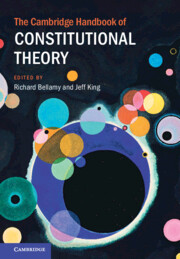Book contents
- The Cambridge Handbook of Constitutional Theory
- The Cambridge Handbook of Constitutional Theory
- Copyright page
- Contents
- Figures
- Contributors
- Frontispiece
- Preface and Acknowledgements
- 1 Introduction
- Part I Values
- Part II Modalities
- 10 Impartiality
- 11 Constitutional Legitimacy
- 12 Sovereignty
- 13 Constituent Power
- 14 Representation
- 15 Deliberation
- 16 Opposition
- 17 The Separation of Powers
- 18 The Rule of Law
- 19 Constitutional Conventions
- 20 Secularism
- 21 Constitutional Review
- 22 Constitutional Interpretation
- 23 Proportionality
- 24 Civil Disobedience
- 25 Constitutional Entrenchment
- 26 Emergency Powers
- 27 Regulation
- 28 Cost–Benefit Analysis
- 29 Revolution
- Part III Institutions
- Part IV Challenges for Constitutional Democracy
- Bibliography
- Index
- References
21 - Constitutional Review
from Part II - Modalities
Published online by Cambridge University Press: 27 March 2025
- The Cambridge Handbook of Constitutional Theory
- The Cambridge Handbook of Constitutional Theory
- Copyright page
- Contents
- Figures
- Contributors
- Frontispiece
- Preface and Acknowledgements
- 1 Introduction
- Part I Values
- Part II Modalities
- 10 Impartiality
- 11 Constitutional Legitimacy
- 12 Sovereignty
- 13 Constituent Power
- 14 Representation
- 15 Deliberation
- 16 Opposition
- 17 The Separation of Powers
- 18 The Rule of Law
- 19 Constitutional Conventions
- 20 Secularism
- 21 Constitutional Review
- 22 Constitutional Interpretation
- 23 Proportionality
- 24 Civil Disobedience
- 25 Constitutional Entrenchment
- 26 Emergency Powers
- 27 Regulation
- 28 Cost–Benefit Analysis
- 29 Revolution
- Part III Institutions
- Part IV Challenges for Constitutional Democracy
- Bibliography
- Index
- References
Summary
The constitutional review debate is highly abstract, often ignoring relevant procedural aspects, and defined by the unrepresentative case of the U.S. Supreme Court. This paper argues against a misleading generality and connects elements of a general critique with various forms of constitutional review. The fact that constitutional review cannot be justified by vague references to ‘rights’ or ‘reason’ raises two questions: Are there relevant differences in the justification (1) and decision-making procedures (2) of courts and legislatures? (1) The general assumption that courts lack democratic legitimacy ignores differences between courts with and without explicit constitutional review mandates. While insufficient to resolve the legitimacy question, such mandates necessitate focusing on a particular court rather than discussing constitutional review in general. (2) The relevance of procedural differences is often overlooked. Examples for this are the non-recognition of the difference between constitutional ‘settlements’ of rights cases by Congress and the Supreme Court, and the disregard for the political character of legal standards. Ultimately, an ambiguity between political, legal and moral constitutionalism becomes apparent. While the critique of constitutional review can be understood as a core topic of political constitutionalism, a community may well opt in favor of legal constitutionalism through its political organs.
Keywords
- Type
- Chapter
- Information
- The Cambridge Handbook of Constitutional Theory , pp. 343 - 360Publisher: Cambridge University PressPrint publication year: 2025

